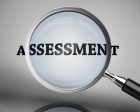Assessment
Level descriptors are no longer statutory to describe, define or assess progress in history. In this section you will find a range of articles and guides to help you make sense of what it means to get better at history to inform planning, monitoring and assessment of progress in the subject.
Sort by:
Date (Newest first) | Title A-Z
Show:
All |
Articles |
Podcasts |
Multipage Articles
-

Assessment and feedback in history
ArticleClick to view -

It worked for me: investing in dialogue as a tool for assessment
ArticleClick to view -

Assessment and Progression without levels
ArticleClick to view -

Progression from EYFS to Key Stage 3
ArticleClick to view

